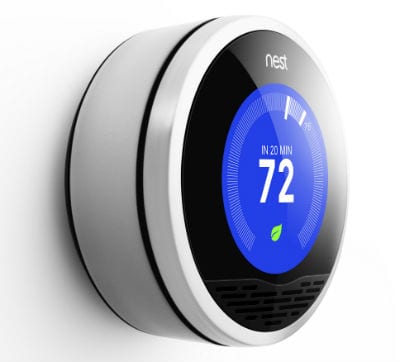 Nest, makers of the popular “learning thermostat,” announced a deal on Monday with Texas utility Reliant, in which customers who sign up for two years of fixed-rate energy services receive one of the popular “smart” thermostats for free.
Nest, makers of the popular “learning thermostat,” announced a deal on Monday with Texas utility Reliant, in which customers who sign up for two years of fixed-rate energy services receive one of the popular “smart” thermostats for free.
Thus far, the Nest device has been aimed directly at consumers — it’s available through Apple’s iTunes store, for instance — not third parties like utility companies. But with the Reliant deal, Nest is able to tap into a new, and potentially very large, distribution channel.
It’s also a win for Reliant, which is able to differentiate itself from its local rivals — Texas is home to several utilities — by offering one of the hottest products on the market. Further, by utilizing the Nest’s “learning” capabilities, in which it can log and optimize customers’ typical heating and cooling behaviors, Reliant should be able to take a bite out of the strain put on its own power grid, especially on super-hot days. Reliant serves 1.5 million customers in Texas. Nest’s makers claim the device can reduce energy consumption by 20 to 30 percent.
“Texas is a very competitive market for electricity,” Patricia Hammond, a spokesperson for Reliant, told the SmartVan. “In Houston on any given day there can be dozens of companies offering electricity service to residential customers, so because it’s such a competitive market, we’re very excited to bring this thermostat to our customers. It provides us with a point of differentiation, and it’s a great offer for our customers.”
Nest is billed as simple to install; Hammond said that most customers typically can hook it up in under 30 minutes. Customers who do require a service tech to perform the install would be charged a separate fee. Reliant is planning to sub-contract the installation to Nest’s Concierge Service.
The Nest/Reliant program is not entirely unique, though: Earlier this year, EcoFactor struck a deal with Comcast to provide the cable company’s customers will “smart” home energy. EcoFactor has also offered its service through another Texas utility, Oncor, as well as NV Energy in Nevada. Further, Verizon Wireless was early to the home energy automation game, with AT&T close behind, while a few other foreign “smart” energy companies have also teamed with service providers — mostly telcos, rather than utilities — to reach wider swaths of customers.
However, the Nest deal is slightly different, but in an important way: Nest is a hardware manufacturer, not a software company. The Nest thermostat itself is responsible for “learning” users’ tendencies, and then tweaking them slightly in order to conserve energy. Other “smart energy” partnerships were between small energy management companies and bigger home services ones (like telcos), where the hardware itself wasn’t central to the program.
Ultimately, though, taken together, these deals add up to something that resembles a movement in the HVAC market. While Web-enabled digital thermostats are clearly a hot (and growing) new product line, there’s a case to be made that their true potential will be reached through partnerships, and not by being marketed directly to consumers.
More: Nest: The Coolest (or Warmest, Depending) Thermostat Out There.
Click here to download a free whitepaper, “Five Steps to Make Field Service Profitable.”

Share this: